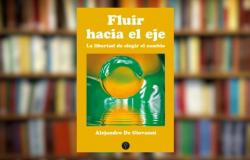In the trick there is a point without return: when the “Vale Four” is sung, the bet reaches its limit. It doesn’t matter if at that moment you have an unbeatable play or only a couple of unusable letters. What counts is the conviction with which Bluff is sustained, the firmness in the look, the decision to go thoroughly even when you have little or you have nothing. In that bold, reckless and deeply human gesture, the symbolic nucleus of Marcelo Figueras’s new novel is condensed.
Valecuatro Reflect on what life implies with the letters that one touchedas a key passage synthesizes: “In the trick -once: as in life -, the crucial is what is achieved with the hand that touched us in luck.” Even when what is distributed in that hand is adverse, insufficient or deeply unfair. From that perspective, the story of a teenager in full school transit during the seventies is not limited to being a training chronicle: it is a vital bet, a lesson narrated with humor and lucidity. Figueras build a Educational novel Rioplatense in a state of grace: fierce but tender at the same time, as political as intimate, fragile and brave.
Valecuatro It enrolls in the tradition of initiation novels in Argentine literature. From Juvenilia by Miguel Cané, going through Don Second Shadow o The rabid toy by Roberto Arlt – simultaneous not and at an antagonistic point – until Rita Hayworth’s betrayal by Manuel Puig and Miss From Hebe Uhart, the Argentine narrative has approached the formative transit as a field of tensions where they collide, without truce, the imposition of norms and the desire for freedom. Figueras’s novel places the vital adventures of its protagonist in the oppressive climate of the seventies, and makes the trick already cunning into powerful allegories of resistance and the construction of subjectivity under an authoritarian regime. From the beginning of the novel, education is presented not as a means of transmission of knowledge, but as a systematic process of domestication. The College of the Good News – with its imposing blue and gray structure, located on Rivadavia Avenue – functions as a machinery aimed at imposing a single behavior. Knowledge is reduced to repetition; The error is sanctioned and the doubt is silencing. In this context, forming means, in the first instance, to capture the posts for survival.
That school regime does not constitute an isolated anomaly, but embodies a period of time. It is no accident that the novel is crossed by images of militarization, surveillance, punishment and delation, which, although they are not named as dictatorship, persistently resonate in the background of every scene. Adolescence rather than a stage of growth is an occupied territory. The need to experiment is thus a threat to order. Hence the adolescent body is the main target of control: it must remain uniform and silent. That is why the most incisive chapters of the novel are those where the body bursts: the collective vomiting in a camp, the crying in class, the striptease From a partner, disgust against food, the indefinite series of disgust. Figueras tells those moments with physiological precision, as if each body symptom were a crack in the system.
One of the protagonist’s foundational learning is that he does not always win who has better letters, but who lies with greater skill. Learning to play the trick, as a more cunning partner is taught, is not just a recreation hobby: it is a lesson about language and life itself. The trick does not reward the truth, but the conviction with which a falsehood is sustained. Knowing how to say “I want it is worth four” with a six and five in the hand – what means, then, know vulnerable and yet to redouble the bet – is the real learning of the novel.
Evasion plan
This learning is not limited to the game: it crosses the entire route of the protagonist within the school. There, the trick is also played, but with other rules: the teacher lies his vocation, the priest falsifies desire, companions adulterate his faith.
School figures parade around the protagonist: pathetic or authoritarian teachers, priests who teach chastity with biblical clumsiness, cruel, accomplices or brilliant classmates, all portrayed with a mixture of sarcasm and tenderness. In that gallery, there are two figures that stand out: Palito, the young tutor who fails in his attempt to approach progressive, and Froilán Aramayo Chalar –Froi-, the cultured friend. This character is a mythology reader, disenchanted, and is presented as a possible mirror: an intelligence that chooses the abyss before domestication.
Froi is also the tragic heart of the novel. Its history does not follow the school initiation curve, but the detour to the unrecoverable. First he is a weird boy, science fiction reader, marginal and magnetic, who observes the world with early lucidity and radical disenchantment. But as the novel progresses, his figure darkens: he stops going to school, gets sick, reappears briefly, and disappears completely. There is no explicit scene about his destiny, but the narrator – and adult – says that Froi chose not to participate in a system governed by obedience, fear and imposture.
The progression of the narrative voice along the forty -eight chapters, which holds its timbre despite the passage of time, is one of the greatest achievements of the book. This voice does not seek to shine or cling to epic or solemnity, but it has an emotional intelligence capable of jumping from sarcasm to tenderness in a single phrase.
There is some generational chronicle, some intimate trial, some theater of memory, but what predominates is a lucidity without cynicism, an ethic of the look that avoids nostalgia and cruelty.
In that look, the maximum point of Valecuatro: humor, which works more as resistance tactics than as an ornament or being part of an evasion plan. The protagonist’s laugh – and that of the adult narrator who recalls it – does not annul the pain, but reveals it. It does not hide it, it gives new conditions of readability. Scripture plays a substantial role throughout the narrative process, because it is not only an expressive medium, but is planted as a conservation vector of the experience lived. The narrator remembers an early literary vocation stimulated by school compositions, which then leads him to write science fiction stories and find an escape route right there.
In this novel, Argentine politics is not doctrine or speech, but a mined field of silences. The narrator recalls the way in which political issues were absent both in school and in houses and how politics did not integrate public discussion. The mandate was to shut up, not ask and therefore not knowing. And if the school was already a space for emotional domestication, the social environment amplified that training with a pedagogy of terror. The novel is not a traditional fresh and the decisive politician happens in an offside. The repression, the proscription of Peronism, the return of Perón, the Triple A and the blow of 76 are subject to rumors, of headlines that are lost in the periodic press and diffuse signs of a latent violence. “There was already talk of a blow, it was an open secret,” recalls the narrator, who at his fourteen years believed that dictatorships were “the most normal in the world.”
And Valecuatro It tells a training process, it also does so through careful reconstruction of customs that marked adolescence in Buenos Aires of the 70s. It is not only about environmental references or nostalgic winks, but of a true affective cartography, where each practice acquires a narrative weight. The forms of meeting, the ways of desire, the codes of friendship, the things of love, all that appears filtered by the adult look that returns on the foundational gestures of its generation. Among the most significant initiatory rites, the “assaults” occupy a central place: those informal meetings in classmates, where it was danced, food and discs were shared, and played to rehearse the entrance to the adult world from the edges of what is allowed. Figueras in addition, some period marks scoring delicately: the cassettes of Of their kind as a gateway to social discomfort; The excursions to fifths that combined pool, trick and musical discoveries; the restricted use of the landline as a loving territory; The circulation of magazines, clothing codes and haircuts.
At the end of this learning adventure, there are no morals or revenge. What remains is a master play: the decision to continue betting, even when the deck seems to be against us. As the protagonist, who learns to lie to survive in the trick of life, the narrator of Valecuatro He knows that growing is not winning, but distributing again, playing differently. And writing, after all, it seems a lot: it is an act of invention that goes hand in hand with cunning and beauty, risk and tenderness, lies and revelation. “I want it is worth four” is beyond being a formula of the game because it is a life ethic, a statement of principles: even if I do not have the best cards, even if my pulse shake and I cut my voice, know all that I am going to go to the end.






